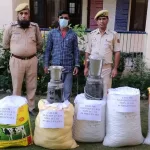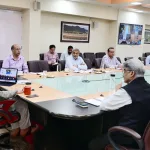In J&K, low physical activity levels persist, with only 11% of adults meeting recommended activity standards according to the World Health Organization (WHO).
Diabetes is a chronic disease that occurs either when the pancreas does not produce enough insulin or when the body cannot effectively use the insulin it produces. Insulin is a hormone that regulates blood glucose. Hyperglycaemia, also called raised blood glucose or raised blood sugar, is a common effect of uncontrolled diabetes and over time leads to serious damage to many of the body’s systems, especially the nerves and blood vessels. To understand the basics of diabetes, Dr Shariq Rashid Masoodi, endocrinologist at SKIMS Soura in an interview with Rising Kashmir’s health correspondent M Peerzada speaks about present scenario, causes, measures, trends and precautionary measures to tackle diabetes .
What is the present scenario of diabetes in J&K particularly in Kashmir?
The prevalence of diabetes is skyrocketing worldwide, particularly in developing nations like India. The current state of diabetes in Jammu and Kashmir, especially in Kashmir, is cause for concern. The prevalence of DM in Jammu and Kashmir is higher than the national average. According to the India State-Level Disease Burden Initiative (ISLDBI), the prevalence of DM in Jammu and Kashmir was 12.9% in 2019, compared to the national average of 10.9%. This means that over one in every eight adults in Jammu and Kashmir is living with DM. Given the limited resources available, this poses a significant challenge for healthcare providers here. Additionally, the rising prevalence of diabetes at an alarming rate, particularly among younger generations, is a matter of grave concern.
What are the symptoms of diabetes?
Diabetes symptoms can vary depending on the type and severity of the condition. Common symptoms include frequent urination, increased thirst, extreme hunger, unexplained weight loss, fatigue, blurred vision, slow-healing sores, and tingling or numbness in the hands or feet. Many people with type 2 diabetes may not experience any noticeable symptoms, or only have mild ones. Therefore, regular blood sugar testing is recommended for adults aged 30 and above, especially those with risk factors (particularly overweight or obese people having family history of diabetes). Early diagnosis and treatment of diabetes are crucial to prevent serious complications.
The prevalence of NCDs including diabetes mellitus is higher than the national average. Please comment on it?
The pevalence of NCDs in Jammu and Kashmir is higher than the national average. According to the ISLDBI, the prevalence of NCDs in Jammu and Kashmir was 32.7% in 2019, compared to the national average of 26.8%. This means that over one-third of the adult population in Jammu and Kashmir is living with at least one NCD. The most common NCDs in Jammu and Kashmir are: Cardiovascular diseases (CVD), Chronic respiratory diseases, Diabetes mellitus, Cancers, and Musculoskeletal disorders.
What are the main causes of diabetes in Kashmir?
The prevalence of diabetes in Jammu and Kashmir is attributed to a combination of factors. Unhealthy dietary patterns, characterized by high carbohydrate and saturated fat intake while lacking in fruits, vegetables, and whole grains, contribute to weight gain and obesity, both significant risk factors for diabetes mellitus.
Additionally, a prevalent sedentary lifestyle, genetic predispositions, and low levels of physical activity further exacerbate the risk of DM in the region.
In Jammu and Kashmir, low physical activity levels persist, with only 11% of adults meeting recommended activity standards according to the World Health Organization (WHO).
High tobacco use, with 22% of adults in the region reported to use tobacco, and increasing rates of overweight and obesity are additional factors contributing to the high prevalence of non-communicable diseases in the area, including cardiovascular diseases, chronic respiratory diseases, and cancers.
What measures are being taken to look after such patients?
The rise in the number of diabetes patients in Jammu and Kashmir is a major health concern. To address this issue, various measures are being taken by the government and healthcare organizations in the region. These measures aim to promote preventive measures, improve access to quality healthcare, and raise awareness about diabetes.
Is the common public being educated to detect the disease?
Efforts are underway to educate the general public about diabetes through various initiatives. Community outreach programs are organized to spread awareness about diabetes, its risk factors, preventive measures, and the significance of early detection and treatment.
These programs engage community leaders, healthcare professionals, and volunteers. Public awareness campaigns are conducted across various media platforms, including television, radio, and print, to inform the public about diabetes and its health implications. These campaigns often showcase success stories and personal accounts from individuals living with diabetes.
What facilities are provided by SKIMS for the patients?
Since its establishment, SKIMS has maintained a well-established Department of Endocrinology boasting a team of six faculty members, including five professors. SKIMS Srinagar’s Department of Endocrinology offers a wide range of diagnostic and treatment services for diabetes patients. Diagnostic services include laboratory tests such as blood glucose tests and BMD tests.
The treatment services feature personalized consultations with experienced endocrinologists, who closely monitor and adjust medication regimens based on individual needs. Dietary counselling is provided to educate patients on diabetes-friendly eating habits. Patient education sessions and workshops offer up-to-date information on diabetes management, self-care, and the importance of follow-ups.
The department is actively involved in diabetes research, contributing to the development of new treatment approaches. Overall, SKIMS Srinagar’s Department of Endocrinology is dedicated to delivering high-quality, patient-centered care to empower individuals with diabetes for effective management and improved health outcomes.
What is the sex wise scenario of diabetes? Is it dominant among males or females?
In Kashmir, the prevalence of diabetes is higher in females than males. Several factors contribute to this disparity, including higher body mass index (BMI), greater prevalence of central obesity, lack of physical activity, and various lifestyle factors.
What precautions should be taken to overcome the disease?
To effectively manage diabetes and reduce the risk of complications, we should adopt healthy lifestyle habits, monitor blood glucose levels, adhere to medication regimens, and seek regular medical check-ups.
What is your message to the general public?
World Diabetes Day serves as a reminder to adopt healthy lifestyle habits to prevent and manage diabetes. Prioritizing a balanced diet, regular exercise, and monitoring blood sugar levels are crucial steps. Adhering to medication regimens, quitting smoking, and seeking support from others can further enhance diabetes management. By embracing these healthy choices, we can collectively create a healthier Kashmir, free from the burden of diabetes.
How important is diagnosis and treatment?
Early diagnosis and treatment of diabetes play a pivotal role in preventing severe complications and promoting overall well-being. Timely diagnosis enables individuals to implement lifestyle changes, initiate medication if needed, and effectively manage their blood sugar levels, thereby reducing the risk of complications and improving their quality of life. By prioritizing early detection and proactive management, individuals can take control of their health and enjoy a longer, healthier life with diabetes.





